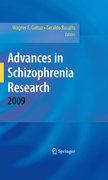
Schizophrenia remains an important challenge to psychiatry, with its causes and underlying brain mechanisms yet to be fully revealed. Currently available treatments are neither universally effective nor without unwanted effects. These aspects, together with the high prevalence of schizophrenia, its often debilitating nature, and the associated family and social burden, make this mental disorder one of the most complex public health issues of our times. The purpose of the Advances in Schizophrenia Research series is to provide comprehensiveperiodic reviews of the wide range of research studies carried out around theworld, with the dual purpose of solving the schizophrenia puzzle, and providing clues to new forms of treatment and prevention for this disorder. A specialfeature of the series is its broad scope, virtually encompassing all fields of schizophrenia research: epidemiology and risk factors; psychopathology; diagnostic boundaries; cognition; outcome and prognosis; pathophysiology; genetics; pharmacological and psychological forms of treatment and rehabilitation; community care; and stigmatization." Based on the Sixth Symposium on the Search for the Causes of Schizophrenia which started in 1986 to commemorate the 600th anniversary of the University of Heidelberg and is now one of the most respected forums for schizophrenia research Content stems from the lectures of 35 leading Scizophrenia researchers addressing an audience of 60 world renowned scientists INDICE: Incidence and outcome of schizophrenia across the globe.- Gene andenvironment interactions and epigenetics of schizophrenia.- The course and outcome of schizophrenia: are there new trends?- Impact of contextual mechanismson the incidence of schizophrenia and other psychoses.- Perspectives and conclusions.- Glutamate-dopamine interactions in schizophrenia.- Schizophrenia: Neurodevelopmental, neurodegenerative or both?.- The neuropathology of schizophrenia: novel findings and epigenetic regulation.- Molecular neuroimaging, pathophysiological mechanisms and drug discovery.- Discussant.- Molecular genetics of schizophrenia: new discoveries and controversies.- Genetic and developmental animal models of schizophrenia.- Neuroproteomic studies of post-mortem brains in schizophrenia.- Neuroimaging studies of gene effects in the brain in schizophrenia.- Pharmacogenomics in schizophrenia.- Perspectives and conclusions.-Prediction of psychosis through the prodromal syndrome.- Is schizophrenia a cognitive disorder?- Disorder of social cognition .- Impact of new strategies (early intervention, second-generation drugs) on the course and outcome of schizophrenia.- Perspectives and conclusions.- Dimensional dysfunctions.- Risk factors for psychosis all impact on dopamine.- Cannabis: clue or distraction?.- The totality of psychosis.- Perspectives and conclusionst.- Comparative efficacy and safety of second-generation antipsychotics: facts and fiction.- Neuroreceptors, schizophrenia and antipsychotic action.- Does the use of long-acting antipsychotics impact significantly on the outcome of schizophrenia?- Modern community care strategies for the treatment of schizophrenia and their impact onoutcome.- Does Stigma impair treatment response and rehabilitation in schizophrenia?- Perspectives and conclusions.
- ISBN: 978-1-4419-0912-1
- Editorial: Springer
- Encuadernacion: Cartoné
- Páginas: 408
- Fecha Publicación: 01/11/2009
- Nº Volúmenes: 1
- Idioma: Inglés
